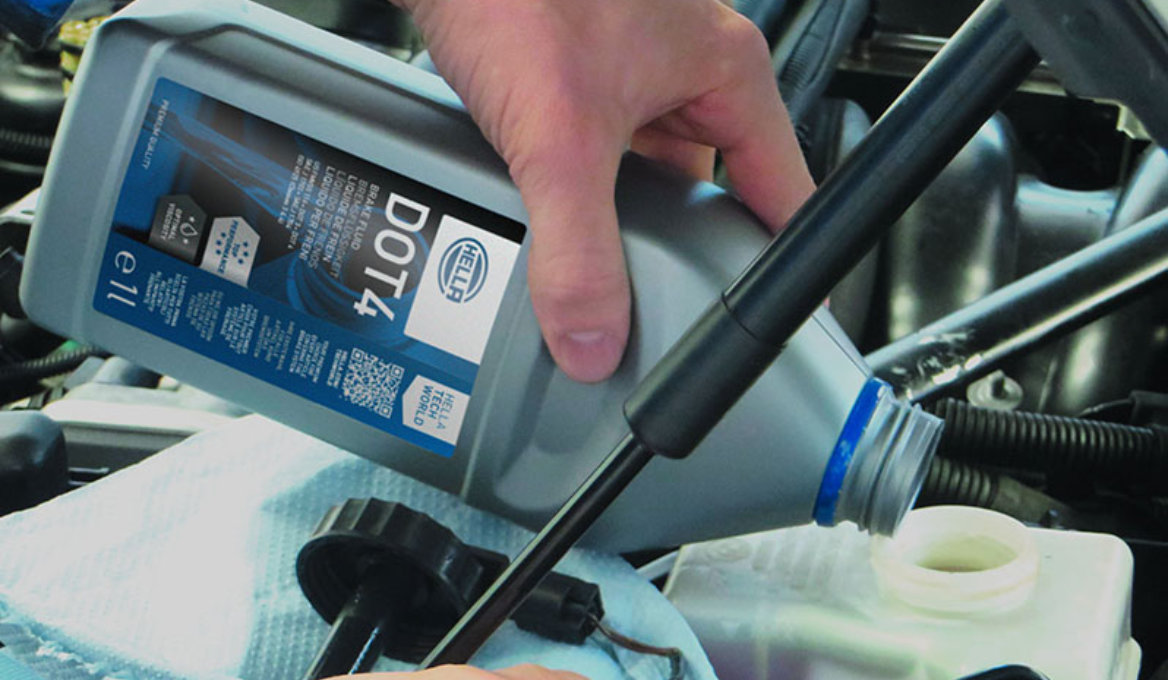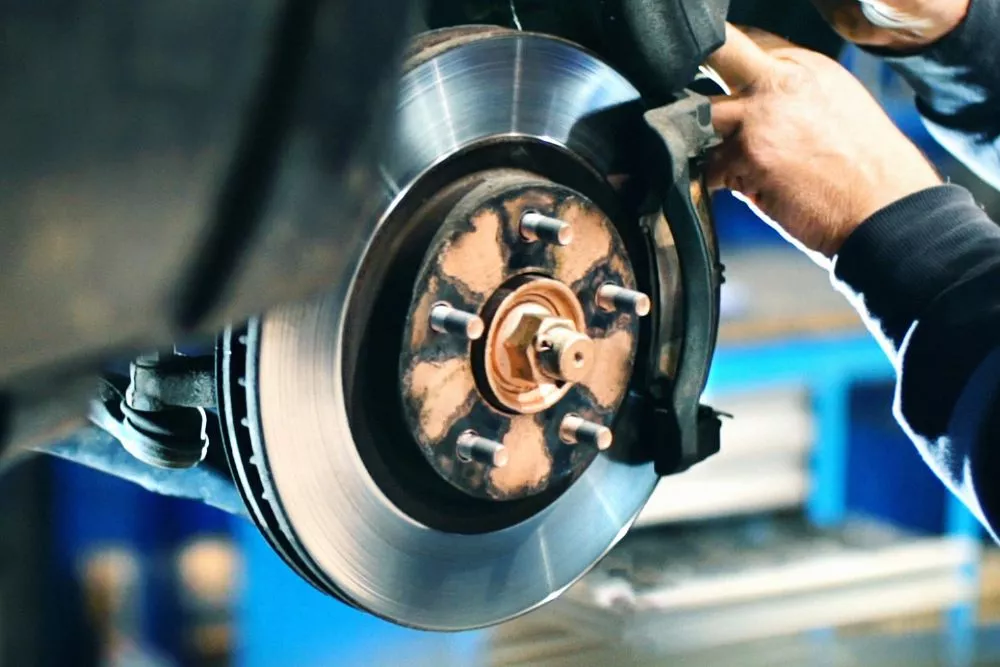Last Updated on October 16, 2025 by Aaron Blake
Have you ever thought about what keeps your car stopping safely every time you press the brake pedal? The answer lies in something you rarely notice: brake fluid.
It might seem like a small detail, but the importance of brake fluid in your vehicle’s safety is huge. If your brake fluid isn’t in good shape, your brakes might not work when you need them most. You’ll discover why brake fluid is vital, how it affects your car’s performance, and what you can do to keep your brakes reliable.
Keep reading—your safety on the road depends on it.

Credit: www.hella.com
Contents
Role Of Brake Fluid
Brake fluid is a special liquid in your car’s braking system. It helps move force from the brake pedal to the brake parts.
Without brake fluid, the brakes cannot work well. It keeps the system safe and effective every time you stop.
How Brake Fluid Works
Brake fluid transfers pressure from the brake pedal to the brake pads or shoes. It moves through brake lines to make the brakes stop the car.
- It is incompressible, so pressure moves quickly.
- It resists heat to avoid boiling under heavy braking.
- It prevents corrosion inside the brake system parts.
- It keeps water out to maintain good performance.
Types Of Brake Fluid
There are different brake fluids made for various cars. They have different chemicals and boiling points.
| Type | Main Use | Boiling Point (Dry) | Boiling Point (Wet) |
| DOT 3 | Most cars | 205°C (401°F) | 140°C (284°F) |
| DOT 4 | Performance cars | 230°C (446°F) | 155°C (311°F) |
| DOT 5 | Military and classic cars | 260°C (500°F) | Not applicable |
| DOT 5.1 | High performance cars | 270°C (518°F) | 180°C (356°F) |
Signs Of Brake Fluid Problems
Brake fluid is very important for your car’s brake system. It helps move force from the brake pedal to the brake parts.
If brake fluid has problems, your brakes may not work well. You should know the signs early.
Common Symptoms
One sign is a soft or spongy brake pedal. This means the brake fluid might have air or leaks.
You may also see a warning light on the dashboard. This light shows there is a brake issue.
- Brake pedal feels soft or sinks down
- Brake warning light is on
- Brakes make unusual noises
- Brake fluid looks dark or dirty
- Car pulls to one side when braking
Effects On Braking Performance
Bad brake fluid lowers how well your brakes work. It can make stopping slower or less safe.
Old or contaminated fluid can cause brake parts to wear out. This leads to more repairs and higher costs.
- Longer stopping distances
- Brake pedal feels weak or unresponsive
- Brake failure risk increases
- Brake system parts corrode faster
Maintenance Tips
Brake fluid is important for safe driving. It helps your brakes work well.
Regular care of brake fluid keeps your vehicle safe and avoids problems.
Checking Brake Fluid Levels
Check brake fluid levels often to keep brakes working well. Low fluid can cause brake failure.
Look at the brake fluid reservoir under the hood. It usually has clear markings.
- Check fluid level when the engine is cool
- Make sure fluid is between “MIN” and “MAX” marks
- Add brake fluid if level is low, using the correct type
- Keep the reservoir cap tight to avoid dirt and moisture
When To Replace Brake Fluid
Brake fluid should be replaced regularly. Old fluid can cause brake problems.
Brake fluid absorbs water over time. This lowers its ability to stop your car safely.
- Replace brake fluid every 2 years or as the car manual says
- Change fluid if it looks dark or dirty
- Replace fluid after brake system repairs
- Have a mechanic flush and refill the brake fluid

Credit: www.mangoautomotive.com
Safety Benefits
Brake fluid plays a key role in vehicle safety. It helps the braking system work properly and keeps drivers safe on the road.
Understanding the safety benefits of brake fluid helps drivers maintain their cars better. This reduces the risk of accidents caused by brake problems.
Preventing Brake Failure
Brake fluid transfers pressure from the brake pedal to the brake parts. Good brake fluid prevents system failure and keeps brakes responsive.
- Stops moisture build-up that can cause corrosion
- Maintains proper pressure under high heat
- Keeps brake parts lubricated and working smoothly
- Prevents air bubbles that reduce braking power
Enhancing Driving Confidence
Reliable brake fluid improves how the brakes respond. This helps drivers feel safe and in control during every drive.
| Benefit | Effect on Driving |
| Consistent Brake Pressure | Brakes respond quickly and smoothly |
| Reduced Brake Fade | Brakes stay strong on long trips |
| Clear Brake Pedal Feel | Driver knows when brakes are applied |
| Less Risk of Brake Failure | More confidence in emergency stops |

Credit: www.johnellisandson.com
Frequently Asked Questions
What Is Brake Fluid And Why Is It Important?
Brake fluid transfers force from the brake pedal to the brakes, helping your car stop safely.
How Often Should Brake Fluid Be Changed?
Brake fluid should be changed every 2 years or 30,000 miles to keep brakes working well.
What Happens If Brake Fluid Is Low Or Dirty?
Low or dirty brake fluid can cause brake failure or reduce braking power, risking safety.
Can Brake Fluid Affect Car’s Braking Performance?
Yes, clean brake fluid helps brakes respond quickly and prevents damage to brake parts.
How Do I Check My Car’s Brake Fluid Level?
Check the brake fluid reservoir under the hood; it should be between the minimum and maximum marks.
Conclusion
Brake fluid keeps your vehicle’s brakes working well and safe. It transfers force from the pedal to the brake parts quickly. Dirty or old brake fluid can cause brake failure. Regular checks and changes prevent accidents and costly repairs. Good brake fluid means better control and shorter stopping distance.
Never ignore brake fluid maintenance for your safety. Stay safe by keeping your brake fluid clean and fresh. Simple steps protect you and your passengers every time you drive. Safety starts with good brake fluid care.





